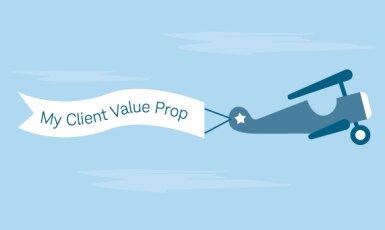How client focus can help boost your RIA firm's growth
Key Points
-
Advisors who define an ideal client have an opportunity to maximize their profitability and attract clients that can help their firm grow.
-
Understanding your ideal client helps you focus on tailoring services to those clients in a way that's repeatable and builds on your firm's strengths.
-
Once you have an ideal client, documenting your client value proposition can help drive your marketing strategy so you stand out from the competition.
It's hard to be everything to every kind of client. Advisors who try, often end up scrambling to carry out a lot of different strategies and tasks or generalizing and providing run-of-the-mill service. The first can be inefficient and often not very profitable. The latter can lead to dissatisfied clients who are hard to retain.
Focusing on a particular type of client (your ideal client) and designing a client experience tailored to those ideal clients can help you aim to maximize both profitability and client satisfaction. Rather than putting the number of clients and AUM first, focus on the experience through your clients' eyes and deliver value that's based on what they want and need.
How can you shift your focus to the right clients for your firm? Start with your ideal client.
What makes an ideal client?
Personality is one factor to consider in an ideal client, but there are many other reasons why a client might be a pleasure to serve. As you think about which clients to focus your practice on, consider demographics, wealth level, communication styles, and values.
What makes a good client focus?
Knowing who you want to serve is a great starting point, but it's also important to know what you want to do. Looking at your practice through your client's eyes means prioritizing client value—delivering what your clients want most.
Consider building a client experience that:
- Addresses a problem that's common within a group.
For example, doctors are high earners, but they start their careers with a lot of debt. A firm that specializes in helping physicians manage debt as they start families and grow their practices could build a loyal clientele that becomes increasingly profitable over time. - Is distinctive.
Focus can help you stand out from the competition. Rather than being on a list of dozens or even hundreds of generalists, you're one of a select few who can address a client's specific concern. A distinctive client experience can also help you stay top-of-mind for referrals. - Is built around something you're good at.
You're more effective when you're doing what you do best. Plus, it feels good to know that you're succeeding at helping people. Look closely at your expertise and explore what makes your service offering exceptional and other ways you are better than the competition. - Require alternative fee structures.
In some ways, you're customizing your business for specific types of clients. This might also mean that the usual fee structures might not work. For example, if you serve business owners who are planning to sell their businesses at some point, the clients' investable assets might be low until they sell.
When you design your business with your ideal client in mind, you can create an experience your clients perceive as valuable—your client value proposition. You client value proposition is a succinct articulation of what sets your firm apart in the eyes of your clients and prospects—it highlights the reasons clients are so happy and why future clients would choose to work with your firm. Considering your client experience from multiple angles and brainstorming ways to address their needs is the foundation of your client value proposition. It can be helpful to write out your client value proposition in a clear, succinct statement. In fact, documenting ideal client personas is something that 79% of top performing firms did in 2022, according to Schwab's 2023 RIA Benchmarking Survey. With this statement in hand, you're ready to begin marketing to your ideal client.
How can you communicate your client value proposition?
Once you have a client focus and a client value proposition, you're ready to build a targeted marketing strategy.
- Messaging: Develop messages that directly address what's on the mind of your ideal client.
- Content marketing: Create useful materials that can help prospects and clients navigate unique challenges. For example, if your firm serves high-net-worth Americans living abroad, you can write articles or create workbooks that help clients learn tax rules, make foreign purchases, or travel safely.
- Advertising: Choose tactics that target specific groups of people where they're most likely to be. For example, ads on an industry website allow you to blanket your potential market without trying to be everywhere at once. Conferences are also an effective way of targeting a specific audience.
- Referrals: Ask happy clients to make referrals. People talk to their friends and peers about their challenges. It's natural for them to mention how their advisor helped.
- Professional networks: Cultivate centers of influence—professionals who are likely to work with your ideal clients. These relationships are often mutually beneficial and can enhance your value in your clients' eyes when you make a key introduction.
The bigger fish advantage
There are a lot of different kinds of people who need financial planning or wealth management services. Focusing on a particular type of client helps you become a bigger fish in a smaller pond rather than just another swimmer in a vast ocean of financial advisors.
It can also make the job more fun. With focus and purpose, you can enjoy time with clients and feel like you're making a difference for the people who need you most.
What you can do next
- If you're already working with Schwab, explore our marketing resources:
- Read "Differentiating Through Client Focus" to learn more about how you can use an ideal client persona and client value proposition to grow your firm.
- Enroll in a self-guided Virtual Practice Management course that can help you develop strategies for growth.
- Consider a custodian that is invested in your success. If you're thinking about becoming an independent RIA (Registered Investment Advisor), contact us to learn more about the potential benefits of a custodial relationship with Schwab.
The Firm Performance Index evaluates firms in the study according to 15 metrics that align with the Guiding Principles for Advisory Firm Success, to arrive at a holistic assessment of each firm's performance across key business areas. It provides comprehensive comparisons for all firms participating in the study, not just within a peer group. The metrics in the Firm Performance Index measure growth in clients, assets and revenue; client attrition; staff attrition; operating margin; time spent on client service; time spent on operations; standardized workflows; written strategic plan and succession plan; and ideal client persona and client value proposition. The Firm Performance Index is calculated among all firms in the study without regard to assets under management or firm type. Firms that rank in the top 20% of the index are included in the Top Performing Firms.
About the RIA Benchmarking Study
Schwab designed this study to capture insights in the registered investment advisor (RIA) industry based on survey responses from individual firms. The study provides information on topics such as asset and revenue growth, sources of new clients, products and pricing, staffing, compensation, marketing, technology, and financial performance. Since the inception of the study in 2006, more than 4,800 firms have participated with many repeat participants. Fielded from January to March 2024, the 2024 study contains self-reported data from 1,304 advisory firms that custody their assets with Schwab and represents $2 trillion in assets under management, making this the leading study in the RIA industry. Schwab did not independently verify or validate the self-reported information. Participant firms represent various sizes and business models. They are categorized into eight peer groups by AUM size. The study is part of Schwab Business Consulting and Education, a practice management offering for RIAs. Grounded in the best practices of leading independent advisory firms, Business Consulting and Education provides insight, guidance, tools, and resources to help RIAs strategically manage and grow their firms.
Past performance is not an indicator of future results.


